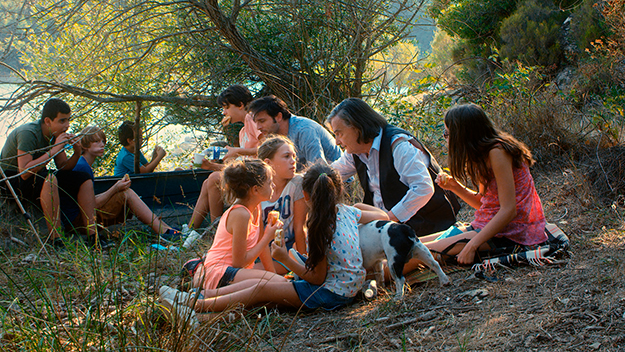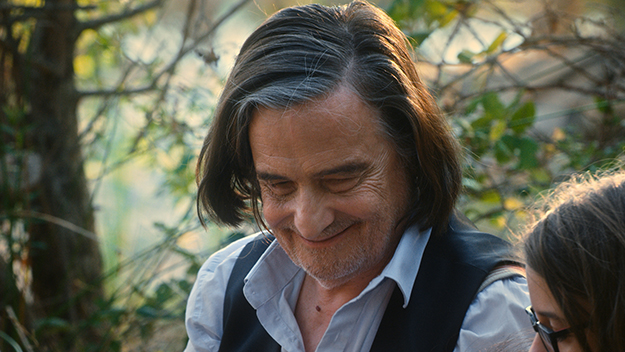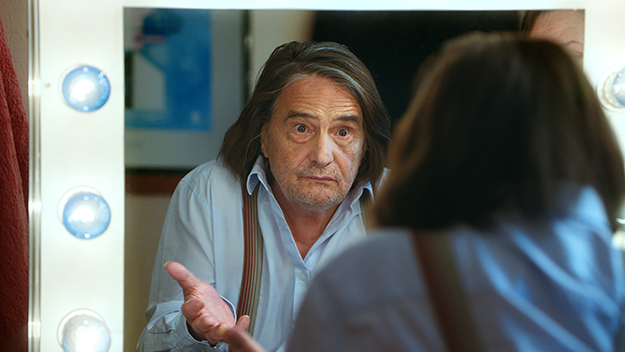Film of the Week: The Lion Sleeps Tonight

There was a time when, given his advanced age and the themes of his films, every new work from the Portuguese veteran Manoel de Oliveira would be hailed by critics as his definitive swansong. This state of affairs went on for something like 30 years, before Oliveira eventually bowed out at the age of 106. Jean-Pierre Léaud could well have many years in him yet—let’s hope so—but in the last year alone he has made two films that it’s hard not to see as valedictory statements. Both are overt contemplations of mortality: first Albert Serra’s The Death of Louis XIV and now Nobuhiro Suwa’s The Lion Sleeps Tonight, screening in official selection in San Sebastian. More specifically, these are both contemplations of Léaud’s own mortality, of his physical decline and the weight of history that he carries as an actor and as a walking embodiment—perhaps the embodiment—of the glories and perils of a life lived in front of the camera.
Serra’s film about the last days of the Sun King was dark and stately, a picture of the rift between the decaying, increasingly immobile body of an elderly man and the transcendent image that he incarnated—the State, Monarchy, Divine Right. The film—in which Léaud’s most demonstrative physical action was the raising in salutation of the royal chapeau—was in the immediate sense simply a depiction of a dying monarch, but given Léaud’s own ravaged appearance and manifest frailty, it seemed very much to be indirectly a portrait of the actor himself.
After all, Léaud no less than Louis XIV incarnates an idea: he is at once a walking history of a certain French cinema, a singular example of what it means to become a living metaphor for your own history, and a living example of the effects of longevity. No one—not the cheerfully battered Belmondo, not the dazzlingly well-preserved Delon—serves to illustrate, as Léaud so strikingly does, the frailty of the human body and the fall from youthful beauty. Plenty of golden young actors have ended up frail and rough, but only Léaud played Antoine Doinel, the incarnation of the energy and promise of youth as a cinematic virtue. And only Léaud, as Doinel or as the variously Doinellian youths of Godard’s, Rivette’s, Eustache’s films, got to grow up in front of our eyes, the new French cinema of the 1960s, ’70s, and ’80s ageing along with him. And only Léaud got to be quite as weathered—from the heron-like grace of his twenties and thirties, his face has somehow collapsed, his skin acquired a pachyderm roughness, as dramatic a physical and, seemingly, a characterial transformation as that of Antonin Artaud, French culture’s patron saint of ravagement.
Directors have been using Léaud as a walking metaphor for mortality and for film history for several years: they have used him not for novelty casting as such, but to represent an idea of damaged glory or to play a kind of phantom, both of himself and of a certain ideal of cinema. (In a parallel, but quite different mode, Gérard Depardieu has lent his bodily presence to numerous films that are “really” self-portraits, or perhaps performance pieces on the theme of going to seed and loving it.) Léaud has often played filmmakers on the verge of some kind of madness, driven there by a failed surge for glory: in Olivier Assayas’s Irma Vep, Christophe Honoré’s The Pornographer, Serge Le Péron’s I Saw Ben Barka Killed (as a semi-deranged Georges Franju). He has embodied the Ghost of French Cinema Past: seen as both the young Doinel on screen and as himself in Paris today in Tsai Ming-liang’s What Time Is It There?. And now, in Nobuhiro Suwa’s film, Léaud essentially plays himself—or the ghost of himself, surrounded by other ghosts.

In The Lion Sleeps Tonight, Léaud plays Jean, an elderly actor shooting a film in which his character dies. An elegant four-minute opening shot, pulling back from Léaud to reveal the action on set, foregrounds the echo of another Léaud film about film, Truffaut’s Day for Night, and shows Jean worrying about the difficulty of dying in front of the camera. His director (Louis-Do de Lencquesaing) tells him how he wants to do it—as “an extinguishment, a falling asleep, something ever so gentle.” Jean has other ideas: “No—death is the encounter, and you prepare for this encounter between the ages of 70 and 80.” Death is, in other words, what Henry James called “the distinguished thing,” and Jean gets a chance to prepare for it because Anna, the co-star of his youth, with whom he’s about to be reunited, is having romantic worries, and refuses to leave her dressing room.
Jean decides to visit some old haunts in this sun-baked South of France, and finds his way into a deserted, creeper-grown old house—one of those rambling phantom palaces that Jacques Rivette delighted in filming. Making his way past a warning sign (“DANGER DE MORT”, if you please), he explores the house and meets a smiling young woman who’s only too happy to see him—Juliette (Pauline Etienne), the love of his life, who died in 1972. Given the almost farcical French cinema convention of casting young women as the love matches for much older men, there’s something both creepy and deeply resonant about the pairing of radiant Etienne with this wizened shell of a dandy: Etienne could be Léaud’s granddaughter, and Jean treats Juliette with the appropriate courtesy. But the image of the duo is a variation on the theme of Death and the Maiden—here, the Maiden and the old man are both Death.
Into this gloomy picture comes Life, in capital letters, in the form of a gang of young children of various ages, who are hanging around the house’s grounds with movie-making equipment. They initially throw taunts at the wild-eyed old man who’s scared them out of the house, then trail him with their camera, and eventually, learning that he’s an actor, start making a movie, with him as an amused, tolerant star. They’ll need a script, he tells them, and they come up with one, which is initially for the film we’re watching, about an empty house, an old man, and the ghost of his beloved—until, that is, some of the younger ones send the action off into zap-gun action territory.
Most films about elderly actors meeting young children agog for the thrill of cinema would send you reaching for le sickbag, but this one works for various reasons. One is the way that Suwa has the children apparently improvising loosely, just generally being argumentative, unruly French kids in a charmingly abrasive and anarchic way. Another is the fact that Léaud’s patented cantankerousness mean that he can’t ever just be an affable uncle figure: he is the obstreperous, unpredictable, entirely mysterious apparition in front of their camera. In one scene, when a smart, confident young lad—clearly the next decade’s François Ozon, or something—confidently offers Jean direction, the actor gets it wrong, and it seems highly likely that Léaud himself is getting it wrong, or feigning to. There’s also a wonderful moment when Léaud goes into an exaggerated impromptu display of those strange demonstrative arm gestures that have been a trademark of his since at least the ’70s: something between interpretative dance and the formal dramatic body language that Léaud must have seen at an impressionable age in a Comédie-Française performance or somewhere similar.

Incidentally, I found myself here at San Sebastian having a discussion with another critic about the mystery of whether Léaud is a good actor or not, in any conventional sense. Certainly, throughout much of his career, he’s certainly been something else—an ineffable presence, which is surely rather better (and, as we agreed, you can’t say that his role in La Maman et la Putain wasn’t superb acting). In The Lion Sleeps Tonight, Léaud doesn’t remotely give a good performance by any conventional criteria; but, as in so much of his latter work, Serra’s film notably, he totally places both his bodily presence and the meaning, the history, of that bodily presence into the film—his shambling but dignified gait, his distracted tendency to seemingly lose focus, the stately, formal diction of an infinitely aged aristocrat. And when he suddenly bellows the film’s title song on a bus, fists clenched in enthusiasm… well, talk about raging against the dying of the light.
It’s not accidental that I started by invoking Oliveira, because there is a flavor here of that director’s late, fable-like films (the autobiographical Journey to the Beginning of the World, for example) or for that matter, his 1942 Aniki-Bobó, one of the great films about children just being children (while also playing at being adults). The Lion Sleeps Tonight could easily have been desperately mawkish, and at moments verges on that, not least because of Olivier Marguerit’s excessively delicate lyrical score. But this is also a film of intense beauty, especially when it comes to color: the reds, blues, and yellows of the interiors are like Matisse paintings come alive, and DP Tom Harari makes the fruit and veg on a storefront display leap out of the screen. It makes a radiant frame for the black and white of Léaud’s elegantly crumpled suits, the coal-and-chalk tones of that quintessentially French fop haircut, the ashen tones of his face.
The film’s title comes from the song, made famous by the Tokens, that Léaud and the kids sing towards the end: it’s also a pun on “Leo” and Léaud, as well as the trigger for a rather miraculous surprise image that Suwa pulls on us near the end. The film is in some ways sweetly inconsequential, even clichéd, in others rather fine—as a return to the magic of cinephilia as a childhood discovery, and as a memento of passing time in which Léaud, French cinema’s erstwhile boy wonder, is surrounded by a chorus of youth, a gaggle of little Antoine and Antoinette Doinels (and their dog). Whether or not Jean actually dies you’ll have to wait and see, but the death that he finally performs, in a return to the opening shot, is done with precision and, as his director hopes, as something “ever so gentle.” I hope Jean-Pierre Léaud has the time to die, or live, on screen ever so gently as many more times as is his pleasure.
Jonathan Romney is a contributing editor to Film Comment and writes its Film of the Week column. He is a member of the London Film Critics Circle.







